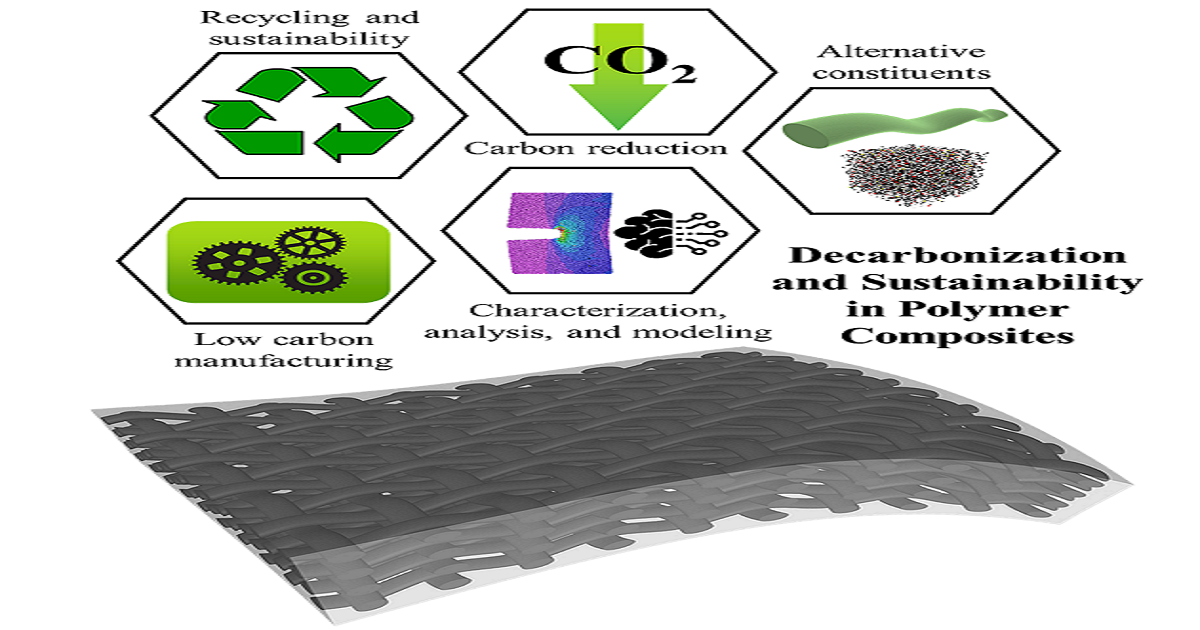Decarbonization and Sustainability in Polymer Composites
A special issue of Materials (ISSN 1996-1944). This special issue belongs to the section "Polymeric Materials".
Deadline for manuscript submissions: 31 December 2024 | Viewed by 210

Special Issue Editors
Interests: polymers; polymer composites; nanocomposites; surfaces; interfaces; mechanics; fatigue; damage; fracture; multi-physics; multi-scale modeling
Special Issues, Collections and Topics in MDPI journals
Interests: polymer composites; mechanical testing; cryogenic mechanical testing; hydrogen effects on mechanical properties; recycling of polymers and composites
Special Issues, Collections and Topics in MDPI journals
Special Issue Information
Dear Colleagues,
Polymer composites, with their ubiquitous properties, have been widely used in various industries (e.g., aerospace, automobile, infrastructure, marine, wind energy, etc.). The constituents in these composites have mainly focused on carbon and glass fibers, as well as epoxy and thermoplastic matrices. However, the issue of their waste and detrimental environmental impact has become increasingly challenging. In this context, the purpose of this Special Issue is to present recent progress in the research and review of decarbonized and sustainable composites and technologies, with the following scopes:
- Polymer composites with alternative reinforcement (e.g., natural fibers, polymer fibers, etc.);
- Polymer composites with alternative matrices (e.g., Vitrimer, bio-based materials, CO2-derived materials, etc.);
- Polymer composites with other sustainable constituents (e.g., wood, waste material, etc.);
- Recycling and repurposing waste plastics and composites;
- Material life cycle, waste management, and carbon footprint analysis of sustainable composites and fabrication methods;
- ML/AI-assisted design towards decarbonization and sustainability;
- Other relevant areas.
Dr. Yao Qiao
Dr. Daniel R. Merkel
Dr. Wenbin Kuang
Guest Editors
Manuscript Submission Information
Manuscripts should be submitted online at www.mdpi.com by registering and logging in to this website. Once you are registered, click here to go to the submission form. Manuscripts can be submitted until the deadline. All submissions that pass pre-check are peer-reviewed. Accepted papers will be published continuously in the journal (as soon as accepted) and will be listed together on the special issue website. Research articles, review articles as well as short communications are invited. For planned papers, a title and short abstract (about 100 words) can be sent to the Editorial Office for announcement on this website.
Submitted manuscripts should not have been published previously, nor be under consideration for publication elsewhere (except conference proceedings papers). All manuscripts are thoroughly refereed through a single-blind peer-review process. A guide for authors and other relevant information for submission of manuscripts is available on the Instructions for Authors page. Materials is an international peer-reviewed open access semimonthly journal published by MDPI.
Please visit the Instructions for Authors page before submitting a manuscript. The Article Processing Charge (APC) for publication in this open access journal is 2600 CHF (Swiss Francs). Submitted papers should be well formatted and use good English. Authors may use MDPI's English editing service prior to publication or during author revisions.
Keywords
- polymer composites
- decarbonization
- sustainability
- waste recycling and repurposing
- materials processing
- manufacturing
- ML/AI analysis








